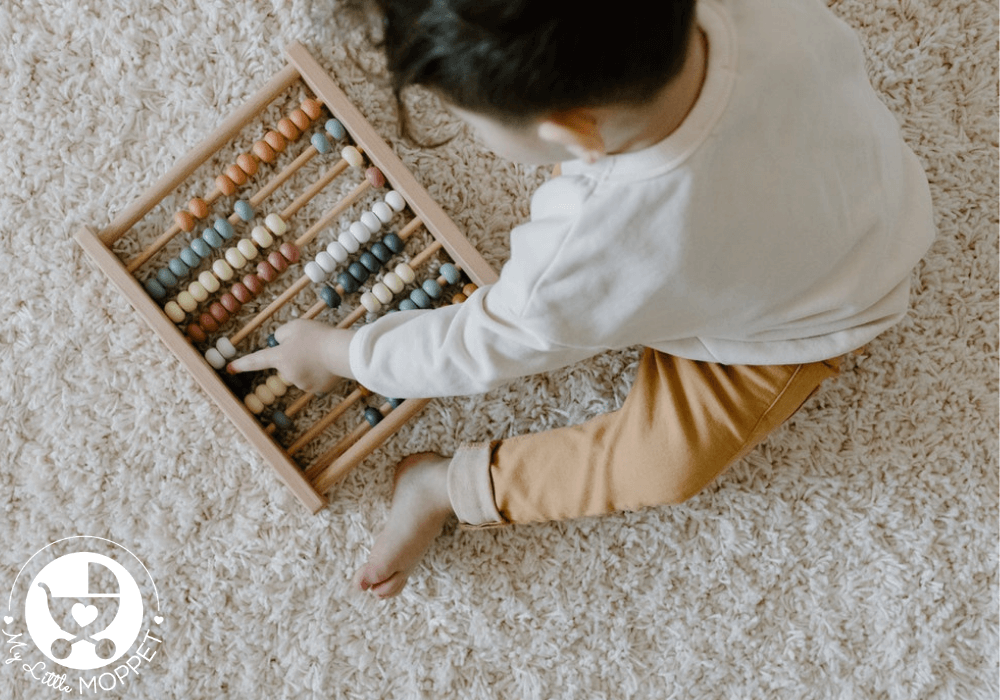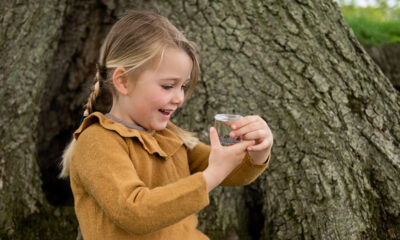Activities
15 Simple Math Activities for Toddlers and Preschoolers

These simple Math Activities for Toddlers and Preschoolers are perfect for developing early Math skills, which are crucial for future academic success.
When most of us think of Math, we have horrible throwbacks to undone homework, problems that seem impossible to solve, and dreaded exams. Few of us associate Math as something enjoyable and exciting, and a lot of it has to do with our conditioning.
While most parents put a lot of importance on early literacy with books and reading, not many realize the importance of early math skills, and this is a phenomenon seen worldwide. One study found that if young kids spent six hours at preschool, they spent only 58 seconds in developing early math skills. This needs to change.
Why are early math skills important?
Early math skills aren’t just important for understanding numbers; they are crucial for problem solving skills and logical and analytical thinking. An article in Developmental Psychology states that early math skills are more important than reading skills in ensuring future academic success. When kids spend time in mathematical learning, their reading skills and concentration goes up automatically.
Here are the math skills that play the biggest role in good problem solving skills and logical reasoning in the school years:
1. Counting and cardinality – This is regarding basic counting, identification of numbers and understanding that number relates to the quantity of items in a group. Children first learn to count forward and later, backward.
2. Comparison – Comparison helps kids identify which item is bigger or smaller, and to differentiate between more and less. They should be able to do this in terms of numbers and things that can’t be counted.
3. Patterns – Patterns can refer to any sequence that repeats in a certain logical manner. This is important in helping kids make connections and predict outcomes of what happens next.
4. Shapes – What later becomes geometry is the study of shapes in early childhood, and this also includes how different shapes fit against and within each other.
5. Measurement – Measuring various aspects of an item, like weight, height or volume is an important part of early math skills, and for very young children it may start with comparison of less and more.
6. Estimation – Estimation is a skill that enables a child to make a well reasoned guess about the size or quantity of an item. This also begins with being able to compare things and differentiate between less an more.
7. Problem solving – Early math skills don’t just teach how to solve a problem – it also teaches kids that there can be multiple ways around a problem, and we can choose the one that is the best.
Early Math Skills according to Age
After this age, kids are usually at school in kindergarten, and formal education takes over. However, with the pandemic on and kids stuck at home, it is up to us parents to make an effort to help our children develop these crucial early math skills. The best way for kids to learn any skill, not just math, is through play. Here are some simple math activities for toddlers, some of which you can also start when your little one is still a baby. As with everything good, the earlier, the better!
1. Sensory Play
Sensory play has several benefits for very young kids, and it can be used in a multitude of ways. Beginners to sensory bins can simply touch and see how everything in the bin feels when their hands go over them. As they get accustomed to it, they can use scoops and cups to fill, empty and refill their containers to get an idea about measurement, quantity and to be able to estimate how much will fill in a cup.
For older toddlers, you can also give them weight scales so they can try to balance both sides – this is a great way to learn comparison and measurement.
2. Interactive Books
This is something you can use even with little babies. There are many books out there with flaps that lift and reveal something underneath, and these teach spatial language – under, over, behind, next etc.
These books frequently incorporate various concepts such as shapes and sizes throughout the content.
Another type of interactive book is one that prompts you to take action. For example, Counting Kisses encourages you to count the kisses and cuddles you give to your little one – a charming way to learn Math!
3. Shape Sorters
Shape sorters are excellent initial toys for babies and toddlers. They not only teach children about different shapes, but they also have corresponding holes for each shape, requiring kids to match the pegs to the correct holes. Playing with shape sorters helps develop spatial skills and reinforces shape distinctions.
Studies indicate that children who learn shapes and develop spatial skills early on tend to have higher IQs and perform better in math and writing. Some shape sorters can also be used as building blocks, like this set. They are brightly colored and help children learn primary colors.
Most households have some cardboard lying around, whether from cereal boxes or online order cartons. You can repurpose this cardboard by creating a simple cardboard shapes activity from My Bored Toddler. Cut out different shapes from cardboard, paint them if desired, and let your child assemble the shapes to create any form or image they like.
Another way to use these shapes is to create patterns. Start with a basic pattern like square-circle-square-circle. Have your child continue the pattern and gradually introduce more complexity by adding a triangle. This activity is ideal for children who do not put objects in their mouth, as cardboard is not durable enough to withstand chewing.
5. Sorting Activities
Recognizing differences and similarities is a key aspect of early math skills. Provide children with a few tubs or baskets and encourage them to sort their toys. Start with simple sorting tasks, such as placing all red toys in one basket or all cars in a box. As children learn about shapes, you can have them sort circular shapes into one container and square shapes into another.
You can also incorporate sorting into everyday activities. For example, during laundry time, ask them to sort shirts and pants into separate piles. When folding clothes, have them group all the socks together, and later, they can try matching pairs of socks.
6. Building Blocks
Building blocks are versatile toys that can be enjoyed by children of all ages, from infancy to adolescence and beyond (just look at adult Lego enthusiasts!). Whether they are plain wooden blocks, colored plastic blocks, or interlocking blocks like Lego, they are excellent for enhancing spatial skills and teaching various math concepts such as balance and symmetry.
Playing with building blocks helps children understand spatial relationships like over, under, and behind. They learn to experiment with creating taller towers by building a sturdy base. Research even suggests that playing with Lego in early childhood can contribute to better math performance in high school.
7. Pattern Play
Understanding patterns is a fundamental early math skill that lays the foundation for learning more complex patterns in school. Patterns help children make connections and predict what comes next. You can create patterns at home using items like dry pasta, toy cars, animals, or building blocks.
Start with simple patterns, such as alternating blocks in different colors, and gradually introduce more complexity by adding additional elements. There are endless possibilities for creating patterns, and you can adjust the difficulty based on your child’s age.
The Best Ideas for Kids offers a simple activity using a cardboard box and cardboard tubes. This toy is engaging for children of all ages. Younger children can enjoy dropping objects in one end and watching them come out the other, reinforcing the concept of cause and effect.
Older children can benefit from this activity by counting and dropping a specific number of pom poms down the tubes. As children begin to learn mathematical operations, it helps them understand the concept of addition. By using activities such as the one where objects roll down chutes and end up in a sum at the bottom, kids can visually see how things combine to create a total.
Another engaging activity for toddlers and preschoolers involves using wooden clothes pegs painted in different colors. Children can match the color of the pegs to numbers on cards, count pegs, and strengthen their hand muscles while playing.
In the kitchen, kids can learn about simple measurements like cups and counting items such as eggs or tomatoes. Older children can explore different types of measurements like cups and spoons, as well as reading numbers on a scale.
Going on an observation walk can also enhance early math skills. Children can count, compare sizes, and use spatial language to describe their surroundings.
Pretend play, such as setting up a play kitchen, can help children develop skills like decision-making and early concepts of money. Board games like Snakes and Ladders and memory games are effective for counting and matching items.
Incorporating physical activities like jump rope and hopscotch into math learning can make it more interactive and engaging. Timed activities, such as marking dates on a calendar or using a timer, can help children understand concepts of time and repetition. When you ask a child to put away his toys, he may drag his feet. However, if you set a timer and challenge him to finish before it runs out, he’ll race to get it done. This not only motivates kids to complete tasks quickly but also helps them understand the concept of time estimation. By engaging in such activities, children can learn that some tasks require more time than others, fostering essential skills for future academic success.
Check out these simple Math Activities for Toddlers and Preschoolers to develop early Math skills, which are crucial for their future academic achievements.
 Please rewrite this sentence.
-

 Destination8 months ago
Destination8 months agoSingapore Airlines CEO set to join board of Air India, BA News, BA
-

 Breaking News10 months ago
Breaking News10 months agoCroatia to reintroduce compulsory military draft as regional tensions soar
-

 Gadgets3 months ago
Gadgets3 months agoSupernatural Season 16 Revival News, Cast, Plot and Release Date
-

 Tech News12 months ago
Tech News12 months agoBangladeshi police agents accused of selling citizens’ personal information on Telegram
-

 Productivity11 months ago
Productivity11 months agoHow Your Contact Center Can Become A Customer Engagement Center
-

 Gadgets3 weeks ago
Gadgets3 weeks agoFallout Season 2 Potential Release Date, Cast, Plot and News
-

 Breaking News10 months ago
Breaking News10 months agoBangladesh crisis: Refaat Ahmed sworn in as Bangladesh’s new chief justice
-

 Toys12 months ago
Toys12 months ago15 of the Best Trike & Tricycles Mums Recommend


































